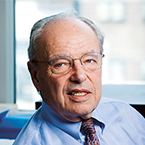
Paul A. Marks, MD, a Fellow of the AACR Academy who translated his passion for molecular biology into transformative leadership of Memorial Sloan Kettering Cancer Center, died April 28, 2020, at the age of 93.
Marks was born in Mahanoy City, Pennsylvania, in 1926. He earned his bachelor’s degree from Columbia University in 1945 and his medical degree from the College of Physicians and Surgeons at Columbia in 1949.
Marks conducted postdoctoral research at the National Institutes of Health and at Institut Pasteur in France. In 1968, Marks returned to his alma mater as a professor, and spent three years as dean, followed by seven years as vice president for Medical Sciences at the College of Physicians and Surgeons.
In 1980, Marks became president and chief executive officer of Memorial Sloan Kettering, a position he would hold for the next 19 years. He guided the institution through the expansion and unification of Memorial Hospital and Sloan Kettering Institute. He increased the focus on basic research in molecular biology, encouraged collaborations between clinicians and researchers, cultivated early-career scientists, and recruited some of the world’s leading cancer experts to join his staff. In 2001, Memorial Sloan Kettering established the Paul Marks Prize for Cancer Research to honor investigators who have made important advances early in their careers.
While presiding over the growth of Memorial Sloan Kettering, Marks made groundbreaking discoveries of his own. His identification of certain genetic defects in DNA helped identify the causes of hemolytic anemia and thalassemia. He also developed the process of cytodifferentiation, in which abnormal cells are coaxed into becoming normal again. Later, Marks led the preclinical research and early stage clinical trial that resulted in U.S. Food and Drug Administration approval of the first histone deacetylase inhibitor, vorinostat, for the treatment of cutaneous T-cell lymphoma.
Marks served as a member of presidential panels on cancer and biomedical research. He was a member of the National Academy of Sciences and the National Academy of Medicine. He was a Fellow of the American Academy of Arts and Sciences and the Royal Society of Medicine in London.
Marks became a member of the AACR in 1957. He served as a member of the Landon-AACR Prize Selection Committee in 2003-2004. He was named a Fellow of the AACR Academy in 2014.
Among many career honors, Marks was awarded the Centenary Medal from Institut Pasteur in 1987, the President’s National Medal of Science in 1991, the Gold Medal for Distinguished Academic Accomplishments from the College of Physicians and Surgeons at Columbia University in 1994, the Lifetime Achievement Award from the American-Italian Cancer Foundation in 1999, the John Stearns Award for Lifetime Achievement in Medicine from The New York Academy of Medicine in 2002, and the European Association for Cancer Research Translational Research Award in 2009.
“Paul Marks was considered the quintessential physician-scientist, as he made major contributions to cell biology and cancer genetics. He combined a brilliant scientific mind with a powerful talent for leadership,” said Margaret Foti, PhD, MD (hc), chief executive officer of the AACR. “His expertise across the spectrum of cancer research made him a treasured resource for many, from early-career physicians to U.S. leaders.”
Career Highlights
2009 European Association for Cancer Research Translational Research Award
2002 The John Stearns Award for Lifetime Achievement in Medicine, The New York Academy of Medicine
1999 Lifetime Achievement Award, American-Italian Cancer Foundation
1994 Gold Medal for Distinguished Academic Accomplishments, College of Physicians and Surgeons, Columbia University
1992 Elected Fellow, The Royal Society of Medicine, London, United Kingdom
1991 President’s National Medal of Science
1989 Robert Wood Johnson Foundation Medal for Distinguished Service
1987 Centenary Medal, Institut Pasteur
1976-1979 President’s Cancer Panel
1973 Elected Member, National Academy of Sciences, Washington, D.C.
1972 Elected Fellow, American Academy of Arts and Sciences
1972 Elected Member, Institute of Medicine
1949 MD, College of Physicians and Surgeons, Columbia University